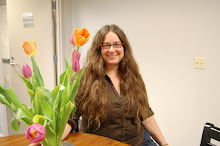My niece came down from Alaska. She's 13. I hadn't seen her in years.
She, my mom (her grandma), and I went to visit the house I grew up in. My dad built it from an old Weyerhauser bunkhouse. It was on an acre of land, on a lake, surrounded by what used to be fields and forest. I remember the house as dark and cold. The livingroom was a great arc of windows. It had more lights outside than in, to see the trees and wildlife at night. I would mash up against the window, holding my book as to a streetlight, to read by the outside light.
My dad shot himself there when I was 16. I hadn't been back since I left for college, except once when my brother was working on it. Thirty years ago, we sold it to one of my high school teachers.
It was surreal, how fantastic the house looked. The field, the 30-acre forest, the boat camp, old Mr. Kelley's house and farm, were all gone. It's all houses now.
But the house was open, airy, surrounded by flowers. Amazingly light. The owners have painted, remodelled, gardened, and loved it for years. It was like a sister of my house. Similar bones, but a woman I didn't know. Tucked in the bank, our old cement-block bomb-shelter still stood with its rusted iron door. It looked tiny.
I felt like I had walked into the Secret Garden.
It was as if the universe was showing me my alternate future. A lifeward path. A path of caring, integrity, kitchen gardens, mint, and great creamy lilies. This small house, so beloved, contained almost everything I love about Poland, Denmark, Russia; people who live like this are respected the world over. It was not important to this couple that I might be directing in Denmark. Compared to their house, I'm not sure it's important to me, either.
For the first time, it occurred to me to just find a job, build a rehearsal studio in my backyard, and settle in.
From there we went to the graveyard.
We called it The Statue Park when we played in it as kids. My father is buried halfway back, near some tree I can never recognize. My mother could, though. She trundled toward it, her army-green raincoat hood over her head, like a hound on the scent. Now I can find it too.
I lay down on the grave, looking at the sky. "This is what I do," I said. "I lie here for an hour or so and talk to him." I got up.
We stood looking at the small square granite stone. PFC Rutherford, a military-paid burial. I felt bad we didn't bring flowers. "Perhaps we could relieve some of the over-flowered graves nearby?" I suggested. "No," said my niece, shocked. "Those are souls."
I picked a handful of wild clover blossoms, and dropped them in the circular hole on the gravestone. "I'll water them," said my mother, pouring the last of her water bottle in unintentional gangsta homage. My niece, who never met my dad or heard much about him, picked her own small bouquet, bound it neatly with a clover stem, and set her tiny fairy-size bouquet on top of my scatter.
For the first time, my eyes were pricking.
When he died, I didn't cry for two months. My mother didn't cry for two years. My brother cried as soon as he heard. All the policemen patted him and looked at us like we were weird. Like Shirley Jackson's characters, we have always lived in the castle.
How nice to find it covered with roses. A house from another fairytale entirely.
Sunday, June 20, 2004
Subscribe to:
Post Comments (Atom)

1 comment:
Rachel, this is touching and beautiful. Thank you.
Post a Comment